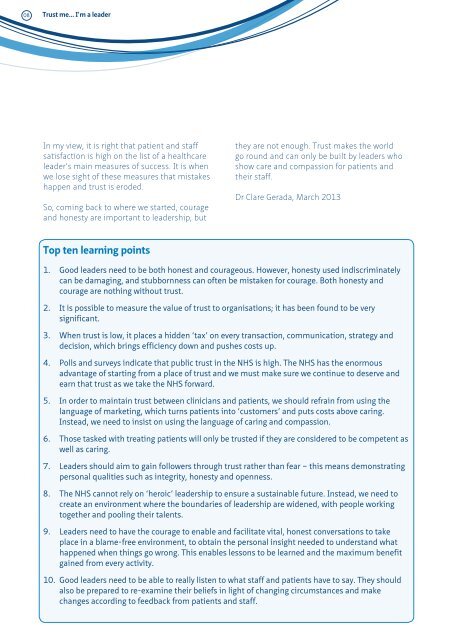trust-me-im-a-leader
trust-me-im-a-leader
trust-me-im-a-leader
Create successful ePaper yourself
Turn your PDF publications into a flip-book with our unique Google optimized e-Paper software.
08<br />
Trust <strong>me</strong>... I’m a <strong>leader</strong><br />
In my view, it is right that patient and staff<br />
satisfaction is high on the list of a healthcare<br />
<strong>leader</strong>’s main <strong>me</strong>asures of success. It is when<br />
we lose sight of these <strong>me</strong>asures that mistakes<br />
happen and <strong>trust</strong> is eroded.<br />
So, coming back to where we started, courage<br />
and honesty are <strong>im</strong>portant to <strong>leader</strong>ship, but<br />
Top ten learning points<br />
they are not enough. Trust makes the world<br />
go round and can only be built by <strong>leader</strong>s who<br />
show care and compassion for patients and<br />
their staff.<br />
Dr Clare Gerada, March 2013<br />
1. Good <strong>leader</strong>s need to be both honest and courageous. However, honesty used indiscr<strong>im</strong>inately<br />
can be damaging, and stubbornness can often be mistaken for courage. Both honesty and<br />
courage are nothing without <strong>trust</strong>.<br />
2. It is possible to <strong>me</strong>asure the value of <strong>trust</strong> to organisations; it has been found to be very<br />
significant.<br />
3. When <strong>trust</strong> is low, it places a hidden ‘tax’ on every transaction, communication, strategy and<br />
decision, which brings efficiency down and pushes costs up.<br />
4. Polls and surveys indicate that public <strong>trust</strong> in the NHS is high. The NHS has the enormous<br />
advantage of starting from a place of <strong>trust</strong> and we must make sure we continue to deserve and<br />
earn that <strong>trust</strong> as we take the NHS forward.<br />
5. In order to maintain <strong>trust</strong> between clinicians and patients, we should refrain from using the<br />
language of marketing, which turns patients into ‘custo<strong>me</strong>rs’ and puts costs above caring.<br />
Instead, we need to insist on using the language of caring and compassion.<br />
6. Those tasked with treating patients will only be <strong>trust</strong>ed if they are considered to be competent as<br />
well as caring.<br />
7. Leaders should a<strong>im</strong> to gain followers through <strong>trust</strong> rather than fear – this <strong>me</strong>ans demonstrating<br />
personal qualities such as integrity, honesty and openness.<br />
8. The NHS cannot rely on ‘heroic’ <strong>leader</strong>ship to ensure a sustainable future. Instead, we need to<br />
create an environ<strong>me</strong>nt where the boundaries of <strong>leader</strong>ship are widened, with people working<br />
together and pooling their talents.<br />
9. Leaders need to have the courage to enable and facilitate vital, honest conversations to take<br />
place in a bla<strong>me</strong>-free environ<strong>me</strong>nt, to obtain the personal insight needed to understand what<br />
happened when things go wrong. This enables lessons to be learned and the max<strong>im</strong>um benefit<br />
gained from every activity.<br />
10. Good <strong>leader</strong>s need to be able to really listen to what staff and patients have to say. They should<br />
also be prepared to re-examine their beliefs in light of changing circumstances and make<br />
changes according to feedback from patients and staff.


